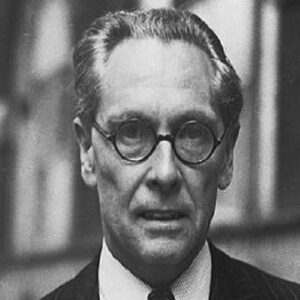Philip Noel-Baker was a British politician and a well-known disarmament campaigner. As a devout pacifist, he passionately advocated for international disarmament and spent 40 years tirelessly campaigning for international peace. In 1959, he was awarded the Nobel Peace Prize for his pacifist efforts. Along with being a politician, he was an amateur athlete who captained the British team and won a silver medal at the 1920 Summer Olympics in Antwerp. He was raised in England in an environment of religious observance and political activism as the son of a Canadian-born Quaker. Baker’s father was a politician, pacifist, and humanitarian, and the young Baker would soon follow suit. He excelled as a student at King’s College, Cambridge, as well as at the universities of Munich and Paris. He eventually entered public service and rose to a series of prestigious ministerial positions. At heart a pacifist, he actively promoted international peace and also wrote extensively on the subject. In 1958, his book ‘The Arms Race: A Program for Global Disarmament’ won the Albert Schweitzer Book Prize. He also played a critical role in the United Nations Charter’s drafting.
Childhood & Adolescence
Philip Noel-Baker was born on 1 November 1889 in Brondesbury Park, London. Joseph Allen Baker, a Canadian-born Quaker, and Elizabeth Balmer Moscrip, a Scottish-born Quaker, were his parents. He was the youngest of six siblings.
His father served on the London County Council as a Progressive Party member and in the House of Commons as a Liberal Party member for East Finsbury.
He was also passionate about humanitarian causes, which his son inherited. Philip as a child was an excellent student.
He attended Ackworth School, Bootham School, and then Haverford College in Pennsylvania, which is affiliated with the Quakers. He was also an athlete.
In 1908, he enrolled at King’s College, Cambridge, where he studied until 1912. In 1912, he served as President of the Cambridge Union Society, and from 1910 to 1912, he served as President of the Cambridge University Athletic Club.
He also spent a brief period of time studying in Paris and Munich. He competed in the Olympic Games in Stockholm in 1912, running the 800 and 1500 meters and reaching the final of the 1500 meters, which was won by his countryman Arnold Jackson.
Career of Philip
He accepted the position of vice-principal of Ruskin College, Oxford, in 1914. The same year, World War I began, and he organized and became commandant of the Friends’ Ambulance Unit stationed on the front lines in France (1914-1915).
In 1920, he captained the British track team and carried the flag at the Summer Olympics in Antwerp. He finished second in the 1,500 meters. He was again named captain for the 1924 Paris Olympics.
Noel-Baker was a member of the League of Nations and the United Nations during their formation, administration, and legislative deliberations. In 1918-1919, he served as Lord Robert Cecil’s principal assistant on the committee that drafted the League of Nations Covenant.
He was invited by the University of London to become the first Sir Ernest Cassell Professor of International Law, which he held from 1924 to 1929. He conducted research on the issues and wrote and published ‘The Geneva Protocol for the Pacific Settlement of International Disputes’ (1925), ‘The League of Nations at Work’ (1926), ‘Disarmament’ (1926), and ‘Disarmament and the Coolidge Conference’ (1926). (1927).
In 1937, he was elected to the Labour Party’s National Executive Committee. Prior to the outbreak of World War II, he spoke out against aerial bombing of German cities on moral grounds in the House of Commons.
He served as a parliamentary secretary in the coalition government’s Ministry of War Transport during World War II, beginning in February 1942. In October 1946, he was appointed Secretary of State for Air; in 1947, he was appointed Secretary of State for Commonwealth Relations and joined the cabinet.
He assisted in the postwar period in drafting the United Nations Charter in San Francisco and was appointed to the British delegation in 1946. In 1946–47, he also served as Chairman of the Labour Party.
He returned to his disarmament studies in the 1950s and published ‘The Arms Race: A Program for World Disarmament’ in 1958. He served as president of UNESCO’s International Council on Sport and Physical Recreation from 1960 to 1982.
Meanwhile, he acted as an adviser to Fridtjof Nansenas in his prisoner-of-war and refugee work, and served on the British delegation to the League’s Assembly from 1929 to 1931. He then spent a year at Yale University as the Dodge Lecturer in 1933-1934.
Significant Works of Philip
Philip Noel-Baker was a pacifist who spent 40 years campaigning for peace through multilateral disarmament. He was instrumental in drafting the United Nations Charter and worked tirelessly to avert nuclear war between the US and the Soviet Union following World War II.
Awards and Accomplishments
In 1959, Philip Noel-Baker was awarded the Nobel Peace Prize for his unflinching campaign for international disarmament.
In 1961, his book ‘The Arms Race: A Program for World Disarmament’ won the Albert Schweitzer Book Prize. It is a comprehensive, historical, and analytical study.
Personal History and Legacies
In 1915, Philip Baker married Irene Noel, an East Grinstead field hospital nurse, and took the hyphenated name Noel-Baker. Francis was the couple’s only child.
However, the marriage was not happy, and Noel-Baker began an affair with Megan Lloyd George in 1936, which lasted until Irene’s death in 1956.
He lived a long life and died in Westminster, London, on 8 October 1982, at the age of 92.
Estimated Net Worth
The net worth of Philip is unknown.
Trivia
This British politician is the only one to have won both an Olympic medal and a Nobel Peace Prize.


